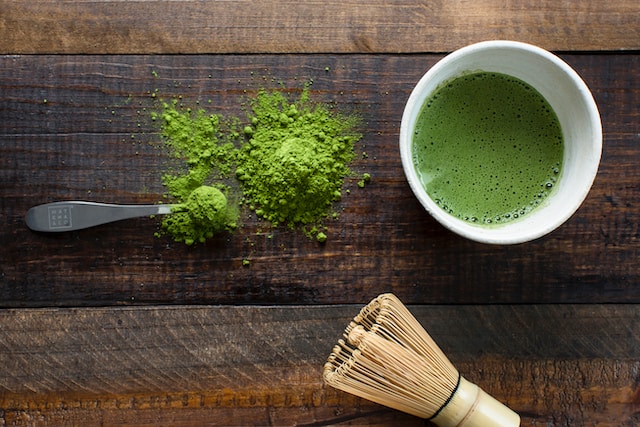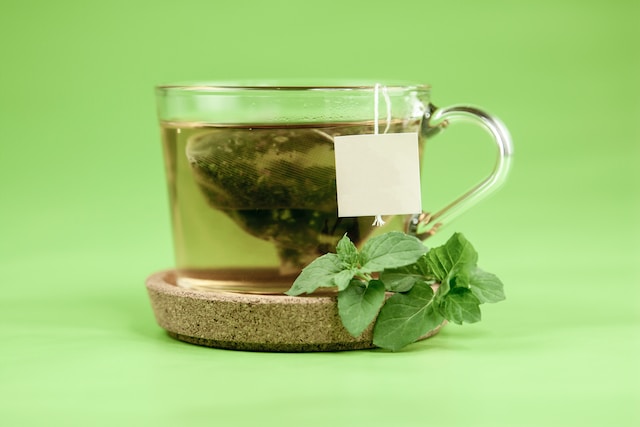Green tea is known for its high antioxidant content and potential weight loss benefits, while black tea is popular for its rich flavor and ability to improve heart health. If you are looking for a healthy beverage that can help you shed some pounds, then green tea may be the perfect choice. On the other hand, if you want a tasty drink that can boost your heart health, then black tea could be the way to go.
Green Tea
(Photo by Matcha & CO on Unsplash )

Green tea is a type of tea made from the leaves of the Camellia sinensis plant, which are steamed or pan-fried rather than fermented like black tea. This minimal processing helps to preserve its natural antioxidants and nutrients, giving it a reputation as one of the healthiest teas around.
One of the main benefits of green tea is its antioxidant content, particularly catechins like EGCG (epigallocatechin gallate), which have been shown to reduce inflammation and protect against chronic diseases such as cancer, heart disease, and Alzheimer’s.
Green tea may also help with weight loss by boosting metabolism and fat burning. It contains caffeine and other compounds that can increase energy expenditure for a short time after consumption.
Another benefit of green tea is its potential to improve brain function. The caffeine in green tea can increase alertness and concentration without causing jitteriness like some other sources of caffeine. Additionally, L-theanine, an amino acid found in green tea, has been shown to promote relaxation and reduce stress.
While there are many types of teas available on the market today, few can match up to the numerous benefits provided by this unfermented wonder known as green tea!
Black Tea
(Photo by Sergey Norkov on Unsplash )

Black tea is a popular beverage that has been consumed for centuries. It’s made from the leaves of the Camellia sinensis plant, just like green and white teas. However, black tea is more oxidized than other types of tea, which gives it its distinctive flavor and color.
One of the main benefits of black tea is its high concentration of antioxidants called polyphenols. These compounds help to protect against cell damage caused by free radicals in the body. Black tea also contains caffeine, which can boost energy levels and mental alertness.
In addition to its health benefits, many people enjoy black tea for its rich flavor and aroma. It’s commonly served with milk or sugar but can also be enjoyed plain or with lemon.
Black tea is often used in cooking as well, particularly in desserts such as cakes and puddings. Its bold flavor pairs well with chocolate, citrus fruits, and spices like cinnamon and ginger.
Black tea offers numerous health benefits while also providing a delicious taste experience that can be enjoyed in many different forms – hot or iced, sweetened or unsweetened – making it a versatile choice for any occasion.
Green Tea Vs. Black Tea – Key differences
The main difference between green and black tea is the way that they are processed. Green tea is made from unfermented leaves that have been steamed or pan-fried to prevent oxidation. Black tea, on the other hand, is made from fully fermented leaves that have been oxidized by exposure to air.
Another key difference between these two teas is their flavor profile. Green tea tends to be lighter and more delicate in taste than black tea which has a stronger flavor with hints of bitterness.
In terms of caffeine content, both teas contain caffeine but at varying levels. Generally speaking, black tea contains more caffeine than green tea due to its longer fermentation process.
When it comes to brewing methods – green teas require cooler water temperature (70-80°C) while boiling water can be used for steeping a cup of black Tea.
Then it’s important for those who love drinking hot beverages like coffee or soda throughout the day should consider switching out one or more cups per day with either type of this beneficial beverage!
Health Benefits of Green Tea
Green tea has been touted as one of the healthiest beverages for centuries, and it’s not hard to see why. Packed with antioxidants and nutrients, green tea is known for its numerous health benefits.
One of the most significant advantages of drinking green tea is its ability to boost metabolism. The catechins in green tea help increase fat burning by helping the body break down fat cells more efficiently. This makes it an excellent choice for those looking to lose weight or maintain a healthy weight.
Green tea also helps improve brain function and mental alertness. It contains caffeine, which is a natural stimulant that can help you stay focused and alert throughout the day without causing jitters or anxiety. Additionally, L-theanine found in green tea can help reduce stress levels while improving cognitive performance.
Green tea has anti-inflammatory properties that can protect against chronic diseases like arthritis, diabetes, heart disease, cancer and Alzheimer’s disease by reducing inflammation on a cellular level.
Green Tea contains powerful antioxidants that work together to neutralize free radicals before they cause damage to our bodies’ cells. These antioxidants play a vital role in promoting overall health and preventing chronic illnesses associated with oxidative stress such as cardiovascular diseases or cancers
Health Benefits of Black Tea
Black tea is a type of tea that is more oxidized than green, white, and oolong teas. It is made from the leaves of the Camellia sinensis plant and has a strong and bold flavor.
One of the health benefits of black tea is its high content of antioxidants called polyphenols. These compounds help protect cells from damage caused by free radicals, which can lead to various diseases such as cancer and heart disease.
Additionally, black tea may also reduce the risk of stroke due to its ability to lower blood pressure and improve blood vessel function. A study published in the American Journal of Clinical Nutrition showed that those who drank three cups or more per day had a 21% reduced risk for stroke compared to those who drank less than one cup per day.
Furthermore, black tea has been shown to improve mental alertness and cognitive function due to its caffeine content. However, it contains less caffeine than coffee making it a better option for individuals looking for an energy boost without experiencing jitters or anxiety.
Regular consumption of black tea may also have positive effects on bone health as research suggests that drinking this beverage can increase bone density over time due to its flavonoid content.
Incorporating black tea into your daily routine may provide numerous health benefits ranging from reducing chronic disease risks to improving brain function.
Which is better for weight loss green or black tea?
When it comes to weight loss, both green and black tea can be beneficial. However, some studies suggest that green tea may have a slight edge over black tea in terms of weight loss benefits.
Green tea contains catechins, which are compounds that have been shown to boost metabolism and increase fat burning. One study found that participants who drank green tea daily for 12 weeks lost more body weight and had a greater reduction in waist circumference compared to those who didn’t consume green tea.
On the other hand, black tea contains theaflavins and thearubigins, which are compounds that have also been linked to weight loss benefits. These compounds may help reduce inflammation in the body and improve insulin sensitivity, which could lead to better weight management.
Both green and black teas can be part of a healthy diet for those looking to lose weight. However, it’s important to remember that no one food or drink will magically melt away pounds on its own – sustainable weight loss requires a combination of healthy eating habits and regular exercise.
Is black tea good for skin whitening?
Yes! Black tea can help in reducing dark spots and giving you a brighter complexion.
Black tea contains antioxidants that help fight free radicals and protect the skin from damage caused by UV rays. It also contains tannins which work as natural astringents to tighten the skin and reduce puffiness around the eyes.
Drinking black tea regularly can improve blood circulation, which helps in providing oxygen and nutrients to your skin cells, ultimately leading to healthy-looking radiant skin. Additionally, black tea’s anti-inflammatory properties make it ideal for people with acne-prone or sensitive skin.
Apart from drinking black tea, you can use it topically as well. Applying cold brewed black tea onto your face with a cotton ball can help reduce dark circles under your eyes and even out your complexion. The caffeine present in black tea can also constrict blood vessels temporarily, thereby making your skin look brighter instantly.
However, it’s important to note that while black tea may have these benefits for some people, everyone’s skin reacts differently so results may vary. Always do a patch test before trying any new skincare routine or product on your face.
What are the side effects of black tea?
While black tea is known to offer a variety of health benefits, it’s important to be aware of its potential side effects. One possible side effect that some people experience is related to the caffeine content in black tea. Because caffeine is a natural stimulant, consuming too much can lead to jitters, anxiety and trouble sleeping.
Additionally, some individuals may experience gastrointestinal issues such as acid reflux or upset stomach after drinking black tea due to its tannin content. Tannins are compounds found in many plant-based foods and beverages that can irritate the digestive system for some people.
Another potential side effect of consuming excessive amounts of black tea over time could be dehydration since it acts as a diuretic that increases urine production. It’s also worth noting that adding sugar or milk to your cup of black tea could add unnecessary calories and negate any potential weight loss benefits you may have been seeking from drinking it.
In general, moderate consumption of black tea should not pose any significant risks for most healthy individuals. However, those with pre-existing medical conditions should consult their healthcare provider before incorporating this beverage into their diet on a regular basis.
featured Image By – Laårk Boshoff on Unsplash








